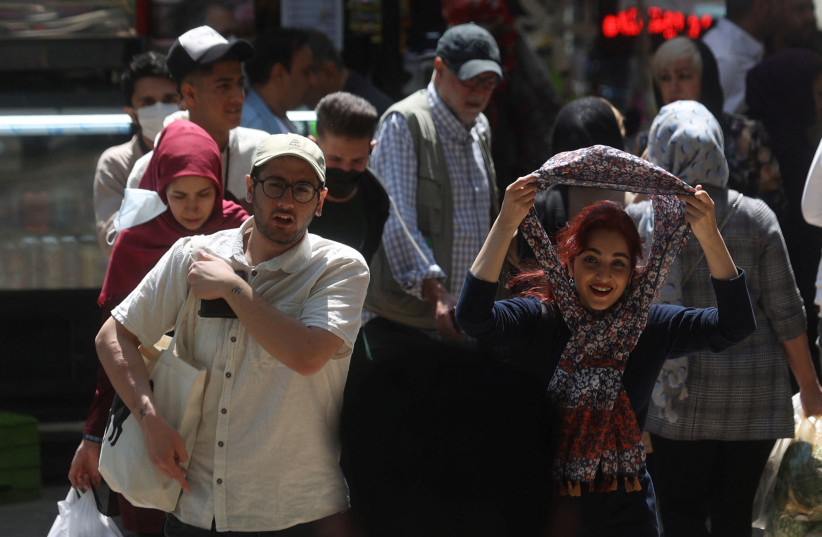Dr. Fatemeh Rajaei-Rad, a professor and surgeon, was fired from the Babol University of Medical Sciences a little over a month after she attended an award ceremony for doctors without wearing a hijab, the doctor announced on her Instagram story on Tuesday.
During the ceremony in late October, Rajaei-Rad was honored as an exemplary doctor in the city of Amol, northeast of Tehran, and was seen in a video from the event receiving the award with her hair uncovered and a scarf wrapped around her neck.
The footage sparked outrage among Iranian officials, with the Friday Prayer Imam of Amol, Ebrahim Yaqoubian, calling for "legal and decisive action" to be taken against the surgeon. Yaqoubian added that the health officials present at the event should have confronted Rajaei-Rad and not given her the award.
Mohammad Baqer Mohammadi Laini, the representative for Iranian Supreme Leader Ali Khamenei in the Mazandaran Province, expressed outrage as well, saying, "This hijab burning is worse than the hijab burnings during the protests," according to Radio Farda.

Laini complained that the medical officials at the ceremony "presented a plaque of appreciation to a brazen insulter of the greatest Islamic commands and applauded."
The surgeon was summoned to the Amol prosecutor's office soon after the event, according to Iranian reports.
Reza Hajipour, the representative of Amol People in Iran's parliament, as well as the head of Amol's paramedical faculty, the head of Imam Khomeini Hospital in Amol, and the head of the medical system of the Mazandaran Province were present at the ceremony.
The head of the hospital was fired and replaced after the event, according to the Fars News Agency.
After the incident, a video was published showing the surgeon apologizing for not wearing the hijab and for "insulting the sanctities" of religious citizens. In the video, Rajaei-Rad also said that she doesn't intend to seek asylum elsewhere, saying "My roots are in this land and water and I have no intention of leaving my country. I chose Iran to live, serve, and die, and that's why I have to obey all laws, including observing hijab."
Shortly after the video was published, a close relative of Rajaei-Rad told the Independent Persian that the surgeon had been detained, beaten, and threatened by agents of the intelligence department in Amol and forced by the agents to read a pre-written text for the video.
Iranian authorities have regularly published videos of detainees confessing and apologizing for supposed crimes, with human rights organizations finding that the detainees were often abused and tortured and forced to film the videos with a pre-made script.
The president of Babol University of Medical Sciences told Fars News Agency in October that the misconduct board for legal procedures to be carried out for her membership on the academic board to be revoked. On Tuesday, a final decision was made to fire her from the university.
"The roaring river finds its way, even if it has to pass through hard and impenetrable rocks," wrote Rajaei-Rad on her Instagram story as she shared the news that she had been fired.
Later on Tuesday, her Instagram page became inaccessible with an error page saying the page may have been removed.
Mahsa Amini, protesters awarded EU human rights award
The firing of Rajaei-Rad came as the European Parliament awarded the Sakharov Prize for Freedom of Thought to Mahsa Amini and the Woman, Life, Freedom Movement. Amini's family was originally meant to be present at the award ceremony, but Iranian authorities confiscated their passports and banned them from leaving Iran on Saturday.
Amini, a Kurdish Iranian woman, was arrested by "morality police" officers in Tehran in mid-September last year for allegedly incorrectly wearing her hijab, with her family saying that she was beaten by the officers in the van that brought her to the police station.
At the police station, she collapsed and was brought to the hospital where she later died. Her relatives have told foreign media that they were kept largely in the dark about the situation.
Amini’s death sparked intensive nationwide protests, commonly referred to as the “Woman, Life, Liberty” (“Jin, Jiyan, Azadî” in Kurdish) protests, last September, which continued in full strength for months on end.
The protests drew the world’s attention, with videos showing demonstrators openly clashing with Iranian security forces in an unprecedented way. In a number of videos shared online, armed security forces could be seen fleeing as masses of protesters confronted their attempts to suppress the demonstrations.
In August, the commander-in-chief of Iran's Islamic Revolutionary Guard Corps (IRGC), Hossein Salami, called the protests “the strongest, most dangerous, and most serious” such demonstrations in the regime’s history.
While Iranian authorities temporarily stepped back enforcement of hijab laws after the protests, since the summer enforcement of hijab laws has been intensified, with police deploying technological measures to catch women without the headscarf.
